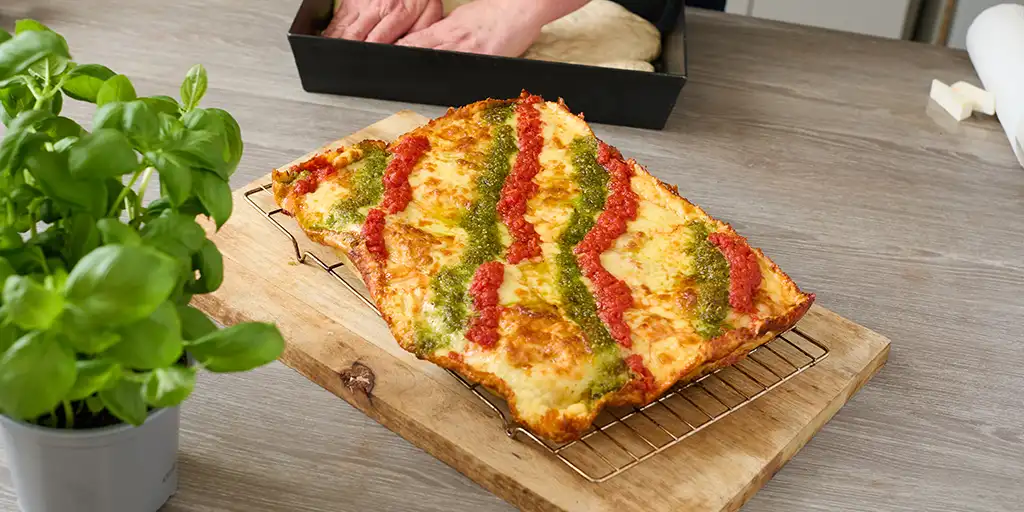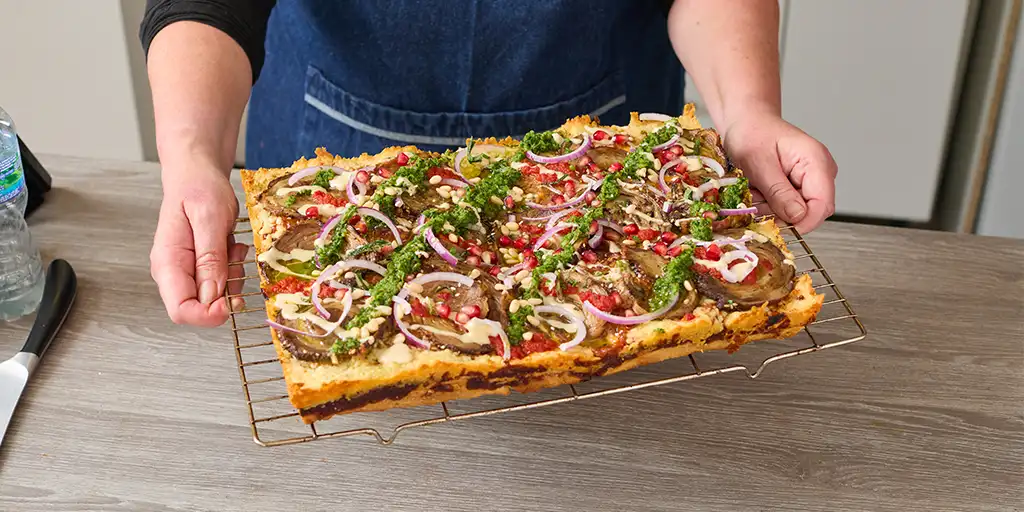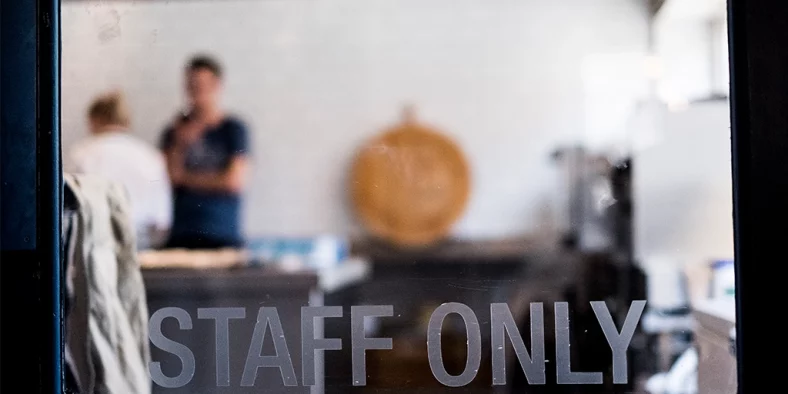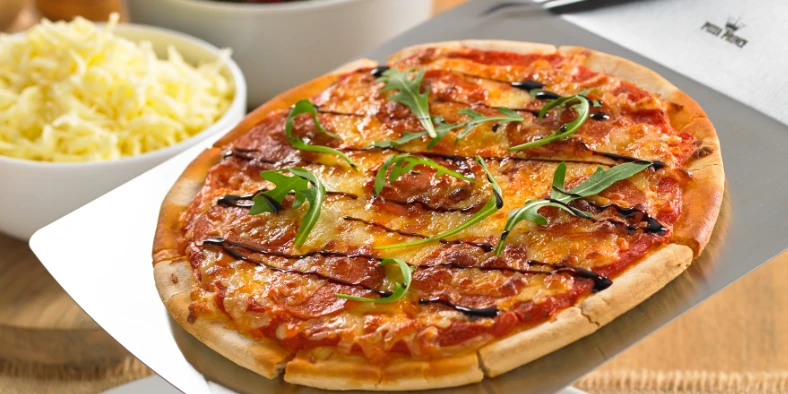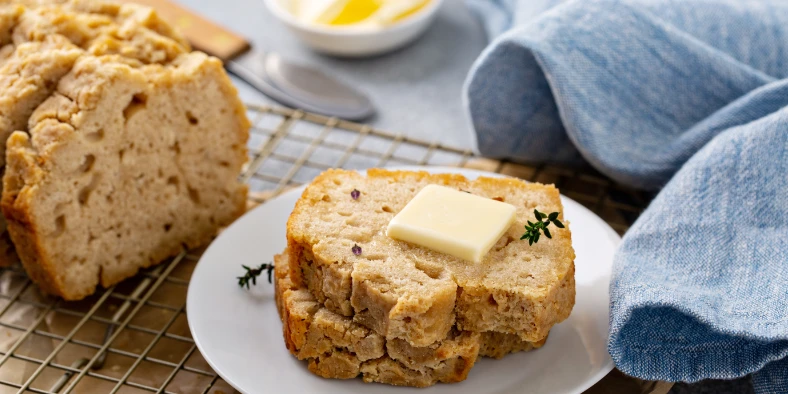Detroit pizza is a distinctive style of pizza that has gained global popularity in recent years. It originated in Detroit, Michigan, in the 1940s and is characterised by its rectangular shape, thick crust, and crispy caramelised cheese edges. Its unique features include a chewy base, a “frico crust,” and sauce layered on the cheese. Known for its rich flavour and satisfying texture, Detroit pizza has evolved from a local speciality to a widely appreciated culinary trend.
Offering a point of difference
Traditional round pizzas will always be popular, but Detroit pizzas offer something different. Many places now serve both. For business owners, Detroit pizzas are easier to make as they don’t require a fancy pizza oven or dough-stretching skills like traditional Neapolitan pizzas. With Detroit pizzas, traditional toppings are optional. Want to make a shawarma pizza? Go ahead. How about spicy Calabrian sausage spiniata for a twist on pepperoni? No problem.
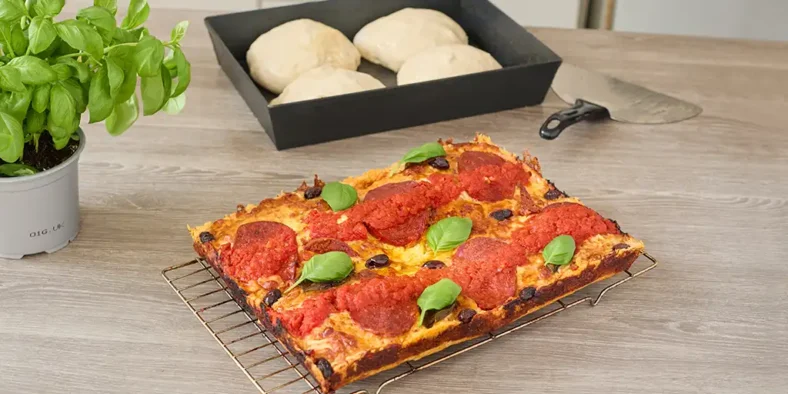
Making the Pizza
Marinara Sauce
Start with a good marinara sauce for Detroit pizza. Unlike Neapolitan-style pizza, which uses uncooked sauce, Detroit pizza sauce is best simmered and cooled before use, to give a rich, thick sauce. Fairway Assured Plum Tomatoes are ideal, as they come from Italy’s Campania region, known for its rich-flavoured tomatoes due to its volcanic soil. The sauce is added on top of the cheese, usually in racing stripes.
The Cheese
Traditionally, Detroit Pizza uses Wisconsin brick cheese, a semi-soft, mild cheese from Wisconsin. A similar mix of Fairway Assured grated mozzarella and either Monterey Jack or mature cheddar can be used in the UK. This combination creates the signature caramelised frico crust, named after a dish of cooked cheese from northeast Italy.
The Perfect Frico Crust
A frico crust on a Detroit pizza is the crispy caramelised edge formed by the melted cheese that reaches the sides of the baking pan. The crust is achieved using the high-fat cheeses mentioned above. As the pizza bakes in a buttered pan, the cheese melts and caramelises against the edges, creating a crunchy, flavourful crust. To enhance the frico crust, generously sprinkle cheese along the perimeter of the dough before baking and after part-baking, ensuring it melts and forms the signature crispy crust.
The Perfect Dough for Detroit Pizza
Detroit pizza dough should be light and airy, achieved by using high hydration dough, around 75%, similar to focaccia. An easier method is to use Fairway Assured dough balls with a little butter or olive oil. Grease your Detroit pizza tray with square edges, let the dough balls defrost in the fridge, prove them, and press them into the tray’s corners. The butter and longer proving time result in a light, airy crust.
To try making Detroit pizzas yourself, order our products (doughballs, cheese, tinned tomatoes) and find our recipes here (link to recipes for Tricolore, Spiniata, Lamb Shawarma).
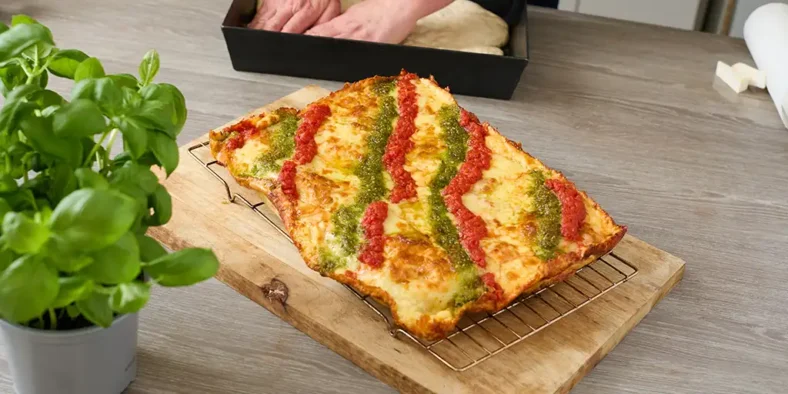
The Rise of Detroit Pizza
Detroit pizzas are everywhere—from street food vendors at festivals and café bars to countless social media posts. These rectangular deep-pan pizzas are gaining popularity thanks to their thick, chewy base, crispy caramelised cheese edges (known as frico crust), and tomato sauce layered on top of the cheese in signature racing stripes. Originating in Detroit, Michigan, this once-local offering is now a global phenomenon. The pizzas are baked in special rectangular tins with square edges lined with butter to give the dough its crispy, almost fried texture. Even better, Detroit pizzas are quick and easy to make, especially with our Fairway Assured Brand Frozen Dough Balls.
The History of Detroit Pizza
Before delving into why Detroit pizzas have become so popular and the best ways to make them, let’s explore their origins.
Beginnings in 1946
In 1946, Gus Guerra and his wife Ana’s uncle opened a bar called Buddy’s Rendezvous in Detroit. Initially, they only served drinks, but the profits weren’t enough to sustain the business. Ana’s Sicilian mother suggested they serve food, so they started offering their Sicilian family recipe pizza, baked in rectangular pans and cut into squares. They used blue steel pans from local automotive suppliers, as traditional baking pans weren’t suitable for the dish.
Spread and Evolution
After the partnership with Ana’s uncle dissolved, Buddy’s was sold, and Gus took their pizza recipe to Eastpointe, opening The Cloverleaf, which still operates today. Employees like delivery driver Shaun Randazzo eventually opened their own pizza places, and soon, Sicilian-style pizza spots were popping up all over the area. By the 1980s, these were referred to as Detroit pizzas. Around 2010, Detroit pizzas began spreading across the United States. When Shaun Randazzo, an ex-Cloverleaf employee, won the title of World Champion Pizza Maker in 2012, Detroit pizzas gained international fame, and the world has been clamouring for corner pieces ever since.
The Recent Popularity Surge
Why have Detroit pizzas become even more popular recently? During the UK lockdown, many turned to breadmaking, which naturally evolved into pizza making. While people couldn’t travel abroad and spent more time at home, many installed wood-fired pizza ovens in their gardens or bought portable gas-powered ones. Online discussions about biga, polish, sourdough, hydration percentages (the amount of water to flour), and types of flour became common. With pubs struggling to survive and pizza margins being very profitable, wood-fired pizza ovens have become commonplace in UK beer gardens, also serving Neapolitan and New York-style pizzas.











